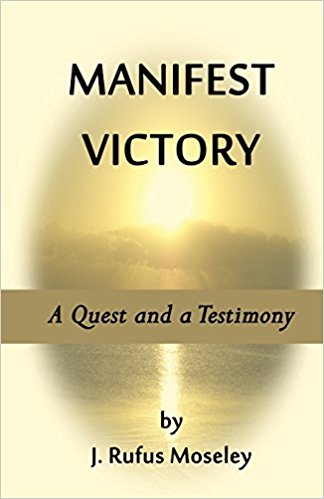Evangelist of Pentecostalism: The Rufus Moseley Story
 Rufus was a good student, but his family could not afford to send him to secondary school, so he read his way through the secondary school curriculum. Through great sacrifice by his parents, Rufus was able to attend the first year of college – he missed a scholarship for that first year because his hand writing was terrible. Thereafter, his own brilliance allowed him to gain one scholarship after another. At Peabody College, he fell in love with the idealist philosophers. In philosophy, “idealist” means that one believes mind is superior to matter, not as in popular language, where “idealist” has a moral connotation. Moseley recalled, “Plato so gripped me that I completely forgot my body. For the first time in my life I was lost in pure intellectual delight.”[5]
Rufus was a good student, but his family could not afford to send him to secondary school, so he read his way through the secondary school curriculum. Through great sacrifice by his parents, Rufus was able to attend the first year of college – he missed a scholarship for that first year because his hand writing was terrible. Thereafter, his own brilliance allowed him to gain one scholarship after another. At Peabody College, he fell in love with the idealist philosophers. In philosophy, “idealist” means that one believes mind is superior to matter, not as in popular language, where “idealist” has a moral connotation. Moseley recalled, “Plato so gripped me that I completely forgot my body. For the first time in my life I was lost in pure intellectual delight.”[5]
But at Peabody he also became a born-again believer. In his second year, a visiting evangelist from Texas came to preach at a nearby church.
When the evangelist made the altar call it seemed that I stood in jeopardy if I did not respond. Some of my college teachers and many of my student friends were present. Their presence made it all the more difficult to take on the cross by acknowledging my need to yield to the Spirit and follow Jesus.[6]
The following night he returned and went to the altar again, this time for a prayer of total dedication to the Lord.
After graduating from Peabody, Moseley went on to graduate studies at the University of Chicago, Heidelberg in Germany, and finally to Harvard University. At Harvard he studied under William James while the renowned philosopher-psychologist was preparing the Varieties of Religious Experience. As with Glenn Clark, Professor James introduced Moseley to New Thought and Christian Science (both forms of radical idealism). In 1894, after his formal studies, he accepted a teaching position at Mercer College, a Baptist institution in Macon, Georgia. There he became a much beloved teacher.
But as he read the literature of Christian Science and New Thought his beliefs about spiritual healing came into conflict with the solidly cessationist Baptist doctrine at Mercer. As I have pointed out elsewhere, although Christian Science and New Thought had serious heretical elements, in their theology of healing they were much closer to the truth than “orthodox” denominations.[7]
All this came to a crisis of conscience. Moseley felt, just as his father who could not hide the smaller watermelons, that he could not hide his attraction to Christian Science from his Baptist brethren. He felt especially drawn to it because it was the first form of Christianity he had seen that offered demonstration for its doctrine in the form of real healings, and because it was an idealist based system[8]. He felt he had to resign. In a talk he gave years later Moseley recounted:
One of the most difficult ordeals that I ever faced was to go before the Board of Trustees of a Southern Baptist college [Mercer] and let them know that I was a big enough fool, in their estimation, to feel there might be something in Christian Science, and to resign my position and go see if there was. For I felt I can’t afford to bring this thing into the college until I know about it and I can’t know about it unless I find out (that is, enter into the movement and experiment with it). And if there is a ray of hope here (in Christian Science), what is conventional success in comparison with finding out the truth.[9]
Moseley resigned from Mercer, and formally joined Christian Science. He quickly learned its affirmation/denial method of healing in which health and goodness were affirmed over illness.[10] With this he was healed of a digestive disorder that had tormented him for years. He continued in the Christian Science movement as one of its “practioners” and as an apologist for the movement. His articles appeared frequently in the Christian Science Journal and Christian Science Sentinel from 1901 to 1909. He articulated a philosopher’s understanding of Christian Science, but also adhered to biblical fact and narrative. He was attempting to bring Christian Science into Biblical accountability.
Category: Church History, Fall 2017


